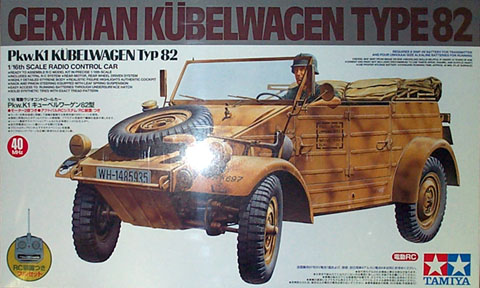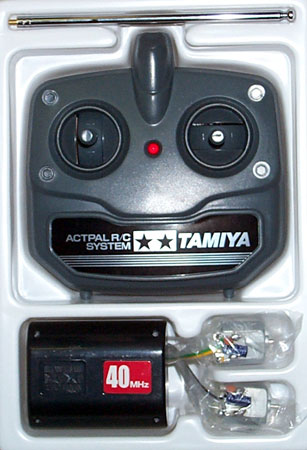|
Pkw.K1
Kübelwagen Typ 82

Tamiya
S
u m m a r y
|
| Catalogue Number
and Description: |
56012 - German Kübelwagen Type 82
Radio Control Car |
| Scale: |
1/16 |
| Price: |
¥9800 |
| Contents and Media: |
97 injection moulded styrene parts
in tan; 5 clear styrene parts; four rubber tyres; many metal and plastic
parts; two electric motors; grease; screwdriver; box wrench; circlip
tool. |
| Review Type: |
FirstLook |
| Advantages: |
Looks good; fun use for a model;
beautiful surface textures well up to Tamiya's standards; some nice
detail enhancements for the larger scale; relatively simple and clever
engineering; includes everything needed for radio control operation
except batteries; four colour and marking options. |
| Disadvantages: |
Some obvious accuracy compromises
for radio and motor gear; a few disappointing detail shortcuts. |
| Recommendation: |
Recommended |
Reviewed by
Brett Green
I saw Tamiya's 1/16 scale radio controlled Kubelwagen on a Japanese website
recently.
The model captured my imagination. I have seen no publicity about this remote
control vehicle in western publications or websites, although a static tropical
version will be available later in the year. The price was affordable compared
to the (seemingly) unattainable 1/16 scale Tiger I, and the images looked
good.
Even better, this remote control scale model would be a great chase car for
my daughter's remote-control Tamiya Mercedes!
My 1/16 scale Kubelwagen arrived from Japan last week.
The sturdy box contains everything that is needed to build and run the remote
control car, including 2 channel radio transmitter, motors and control unit. The
only extra expense will be batteries.
There are a surprisingly small number of plastic parts for such a large kit.
Less than 100 parts in tan and grey styrene exude Tamiya quality. 5 clear
plastic parts and a host of multi-media pieces make up the remainder of the
model. Tamiya round out the package by supplying several tools and even a tube
of grease.
Click the Thumbnails below to view
the images full sized.
Use your browser's "Back" arrow to return to this page.





Instructions are called out in 25 steps, with a further 4 steps describing
the operation and maintenance of the car. The 22 page instruction book is
clearly illustrated with captions where required. Markings are supplied for four
vehicles. These offer nice variety, with one vehicle in overall dark yellow, one
in panzer grey, one in a disruptive scheme of green over dark yellow, and the
final option of red-brown over dark yellow.

Surface texture is gorgeous. The distinctive pressed ribs on the vehicle are
beautifully reproduced inside and out. The fabric texture of the seats and the
folded hood are equally good. They will look fantastic after a subtle oil
wash.
There are some very slight ejector pin marks on the inner surface of the
body. A few of these will be visible inside the cabin if they are not filled.
 I
was delighted to see that this large-scale vehicle has received extra
attention to a number of detail parts. The dashboard offers the option of
a painted instrument face or a decal. Both options supply a clear lens for
added authenticity. The headlights include a clear lens behind the
blackout covers. The Notek assembly includes a part representing the
slotted light lens. The tail light also has an optional clear part that
will look great when painted carefully. The clamp and restraining strap
for the shovel are moulded on, but look quite convincing. All of these
aspects of the kit are a noticeable improvement over its 1/35 scale
counterpart. I
was delighted to see that this large-scale vehicle has received extra
attention to a number of detail parts. The dashboard offers the option of
a painted instrument face or a decal. Both options supply a clear lens for
added authenticity. The headlights include a clear lens behind the
blackout covers. The Notek assembly includes a part representing the
slotted light lens. The tail light also has an optional clear part that
will look great when painted carefully. The clamp and restraining strap
for the shovel are moulded on, but look quite convincing. All of these
aspects of the kit are a noticeable improvement over its 1/35 scale
counterpart.
The timber slat floor is attached to the front fenders. This part is
secured over the floor of the chassis, which is accurately moulded with
pressed ribs. This will look three-dimensionally authentic when assembled.
However, some obvious compromises have been made to accommodate the
control unit, motors, batteries and steering mechanism. The most prominent
fictitious addition is a new front bumper bar. This is a plastic part
moulded to the lower chassis cover. It will undoubtedly protect the front
of the vehicle from minor collisions with furniture and children, but many
purists will probably remove the part. The front suspension is also a
practical concession to the radio control, but it actually does not look
too bad - it is at least in the spirit of the real thing.
Next is a large lump in front of the back seat. This houses the four
AAA batteries. I will be covering this with a lead-foil tarpaulin and a
jerry can (if I can find one in 1/16 scale). Of course, the bottom of the
vehicle has access to the battery compartment too. The wheels are not
detailed on the rear (but the faces look great), and the reduction gear on
the rear drive wheel is gigantic.
The radio requires a large antenna on the rear of the vehicle. Other
minor points are the lack of pedals (also missed in the 1/35 scale Tamiya
kit) and, somewhat annoyingly, moulded-on door handles, inside and out.
The real door handles are curved and stand proud of the doors. Separate
parts would have been far more appropriate in this scale. |
If accuracy is your ultimate objective, the static model due later in the
year should address most of the issues raised in this review. Judging from the
parts breakdown, the static model will have a totally different chassis and
suspension.
On the other hand, if you have always hankered to see your scale creations on
the move, then this large scale Kubelwagen is for you. The compromises to
accommodate the control unit, batteries and steering gear have been kept to a
minimum, and the remainder of the kit is pure Tamiya.
I sincerely hope that Tamiya continue to release these big vehicles.
Recommended.
Review Copyright © 2001 by Brett
Green
Page Created 13 March, 2001
Last updated 22 July, 2003
Back to HyperScale
Main Page
Back to Reviews
Page
|
Home | What's
New | Features
| Gallery |
Reviews | Reference
| Forum
| Search